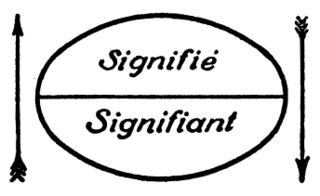
Pierre-Félix Guattari was a French psychoanalyst, political philosopher, semiotician, social activist, and screenwriter. He co-founded schizoanalysis with Gilles Deleuze, and ecosophy with Arne Næss, and is best known for his literary and philosophical collaborations with Deleuze, most notably Anti-Oedipus (1972) and A Thousand Plateaus (1980), the two volumes of their theoretical work Capitalism and Schizophrenia.

Gilles Louis René Deleuze was a French philosopher who, from the early 1950s until his death in 1995, wrote on philosophy, literature, film, and fine art. His most popular works were the two volumes of Capitalism and Schizophrenia: Anti-Oedipus (1972) and A Thousand Plateaus (1980), both co-written with psychoanalyst Félix Guattari. His metaphysical treatise Difference and Repetition (1968) is considered by many scholars to be his magnum opus.
Schizoanalysis is a set of theories and techniques developed by philosopher Gilles Deleuze and psychoanalyst Félix Guattari, first expounded in their book Anti-Oedipus (1972) and continued in their follow-up work, A Thousand Plateaus (1980).

Manuel DeLanda is a Mexican-American writer, artist and philosopher who has lived in New York since 1975. He is a lecturer in architecture at the Princeton University School of Architecture and the University of Pennsylvania School of Design, where he teaches courses on the philosophy of urban history and the dynamics of cities as historical actors with an emphasis on the importance of self-organization and material culture in the understanding of a city. DeLanda also teaches architectural theory as an adjunct professor of architecture and urban design at the Pratt Institute and serves as the Gilles Deleuze Chair and Professor of Philosophy at the European Graduate School. He holds a BFA from the School of Visual Arts (1979) and a PhD in media and communication from the European Graduate School (2010).

A Thousand Plateaus: Capitalism and Schizophrenia is a 1980 book by the French philosopher Gilles Deleuze and the French psychoanalyst Félix Guattari. It is the second and final volume of their collaborative work Capitalism and Schizophrenia. While the first volume, Anti-Oedipus (1972), was a critique of contemporary uses of psychoanalysis and Marxism, A Thousand Plateaus was developed as an experimental work of philosophy covering a far wider range of topics, serving as a "positive exercise" in what Deleuze and Guattari refer to as rhizomatic thought.

Anti-Oedipus: Capitalism and Schizophrenia is a 1972 book by French authors Gilles Deleuze and Félix Guattari, the former a philosopher and the latter a psychoanalyst. It is the first volume of their collaborative work Capitalism and Schizophrenia, the second being A Thousand Plateaus (1980).

Brian Massumi is a Canadian philosopher and social theorist. Massumi's research spans the fields of art, architecture, cultural studies, political theory and philosophy. His work explores the intersection between power, perception, and creativity to develop an approach to thought and social action bridging the aesthetic and political domains. He is a retired professor in the Communications Department of the Université de Montréal.
In critical theory, deterritorialization is the process by which a social relation, called a territory, has its current organization and context altered, mutated or destroyed. The components then constitute a new territory, which is the process of reterritorialization.
Reterritorialization is the restructuring of a place or territory that has experienced deterritorialization. Deterritorialization is a term created by Deleuze and Guattari in their philosophical project Capitalism and Schizophrenia (1972–1980). They distinguished that relative deterritorialization is always accompanied by reterritorialization. It is the design of the new power. For example, when the Spanish conquered the Aztecs, and after the Spanish deterritorialized by eliminating the symbols of the Aztecs' beliefs and rituals, the Spanish then reterritorialized by putting up their own beliefs and rituals. This form of propaganda established their takeover of the land. Propaganda is an attempt to reterritorialize by influencing people's ideas through information distributed on a large scale. For example, during World War I, the U.S. put up posters everywhere to encourage young men to join the military and fight.
Affect is a concept, used in the philosophy of Baruch Spinoza and elaborated by Henri Bergson, Gilles Deleuze and Félix Guattari, that places emphasis on bodily or embodied experience. The word affect takes on a different meaning in psychology and other fields.
Minority is a philosophical concept developed by Gilles Deleuze and Félix Guattari in their books Kafka: Towards a Minor Literature (1975), A Thousand Plateaus (1980), and elsewhere. In these texts, they criticize the concept of "majority". For Deleuze and Guattari, "becoming-minor(itarian)" is primarily an ethical action, one of the becomings one is affected by when avoiding "becoming-fascist". They argued further that the concept of a "people", when invoked by subordinate groups or those aligned with them, always refers to a minority, whatever its numerical power might be.

The body without organs is a fuzzy concept used in the work of French philosophers Gilles Deleuze and Félix Guattari. The concept describes the unregulated potential of a body—not necessarily human— without organizational structures imposed on its constituent parts, operating freely. The term was first used by French writer Antonin Artaud in his 1947 play To Have Done With the Judgment of God, later adapted by Deleuze in his book The Logic of Sense, and ambiguously expanded upon by himself and Guattari in both volumes of their work Capitalism and Schizophrenia.
Desiring-production is a term coined by the French thinkers Gilles Deleuze and Félix Guattari in their book Anti-Oedipus (1972).
Plane of immanence is a founding concept in the metaphysics or ontology of French philosopher Gilles Deleuze.
A rhizome is a concept in post-structuralism describing a nonlinear network. It appears in the work of French theorists Deleuze and Guattari, who used the term in their book A Thousand Plateaus to refer to networks that establish "connections between semiotic chains, organizations of power, and circumstances relative to the arts, sciences and social struggles" with no apparent order or coherency. A rhizome is purely a network of multiplicities that are not arborescent with properties similar to lattices. Deleuze referred to it as extending from his concept of an "image of thought" that he had previously discussed in Difference and Repetition.
A line of flight or a line of escape is a concept developed by Gilles Deleuze and Félix Guattari in their work Capitalism and Schizophrenia. It describes one out of three lines forming what Deleuze and Guattari call assemblages, and serves as a factor in an assemblage that ultimately allows it to change and adapt to said changes, which can be associated with new sociological, political and psychological factors. Translator Brian Massumi notes that in French, "Fuite covers not only the act of fleeing or eluding but also flowing, leaking, and disappearing into the distance. It has no relation to flying."

A New Philosophy of Society: Assemblage Theory and Social Complexity is a 2006 book by the philosopher Manuel DeLanda. The book is an attempt to loosely define a new ontology for use by social theorists — one that challenges the existing paradigm of meaningful social analyses being possible only on the level of either individuals (micro-reductionism) or "society as a whole" (macro-reductionism). Instead, the book employs Gilles Deleuze's and Félix Guattari's theory of assemblages from A Thousand Plateaus (1980) to posit social entities on all scales that are best analysed through their components.

In semiotics, signified and signifier are the two main components of a sign, where signified is what the sign represents or refers to, known as the "plane of content", and signifier which is the "plane of expression" or the observable aspects of the sign itself. The idea was first proposed in the work of Swiss linguist Ferdinand de Saussure, one of the two founders of semiotics.
New materialism is a broad field within contemporary philosophy which seek to engage with the traditions of materialist philosophy as well as develop new articulations between intellectual currents in science and philosophy. New Materialists often draw on Gilles Deleuze and Félix Guattari's theories of the rhizome, as well as materialist interpretations of Baruch Spinoza's concept of immanence. Many philosophical tendencies are associated with new materialism, in such a way that the field resists a common definition. Common characteristics of New Materialists include the rejection of representationalism, humanism, and the intrinsic distinction of subjectivity and knowledge. New materialism also shares a critical reaction to the theoretical dominance of radical constructionism as well as the normative and analytic political theory. Some theoreticians also emphasize the critique of the deficits and inconsistencies of previous paradigms of materialism, such as phenomenology and Marxism.








